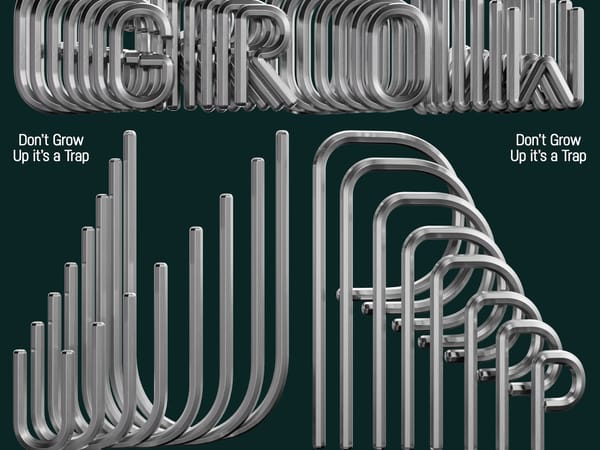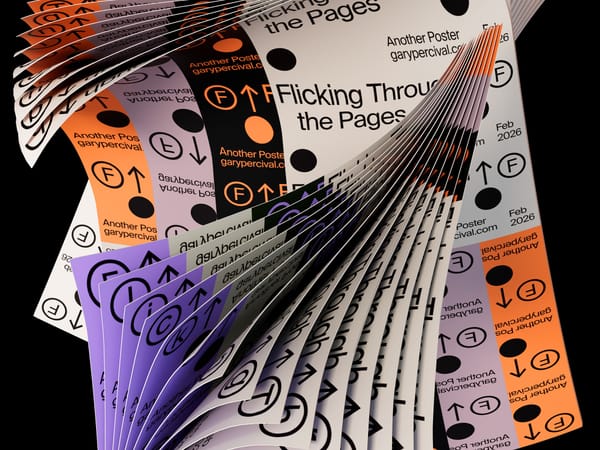Why a Growth Mindset is Essential for Freelancers and Creatives
We all know people who seem to coast through life, never really pushing themselves or striving for more.


We all know people who seem to coast through life, never really pushing themselves or striving for more.
Conversely, we also know people who appear to be driven, hungry for knowledge, and constantly working to improve their skills.
These different mindsets tend to fall into two categories: a fixed mindset and a growth mindset.
Those with a fixed mindset believe that talents and abilities are set in stone. You're either naturally gifted at something—like art, writing, or design—or you're not.
With a growth mindset, on the other hand, people understand that skills can be developed through hard work, learning, and persistence. Intelligence and talent are not finite.
For those working in creative and freelance careers, having a growth mindset is absolutely essential. Unlike a traditional nine-to-five job, you don't have the luxury of coasting in your comfort zone.
Constant reskilling is required to stay competitive in fields driven by nonstop change and innovation. You have to actively push yourself, learn new tools and techniques, and quickly adapt based on client needs.
Constructive criticism is also critical for growth and is not something to be avoided.
Let's explore why adopting a growth mindset, with its hunger for challenge and learning, is key for freelancers and creatives seeking to build sustaining, future-proof careers.
By continually expanding your skills and believing in your potential for growth, you put yourself in the best possible position to thrive.
The Traditional Obstacles for Freelancers and Creatives
Freelancing and creative careers are notoriously turbulent; you never know when the next big contract or client will come along. One month you may be overloaded with projects, and the next you're anxiously waiting for the email to arrive or the phone to ring.
This volatility and unpredictability can take a mental toll.
It's easy to become risk-averse, sticking with what you know rather than stretching your abilities. The fear of failure looms large—what if I pitch this big client and mess it up?
Imposter syndrome runs rampant as well. Even successful freelancers and creatives secretly worry they'll be exposed as untalented frauds.
Many freelancers cope with the uncertainty by trying to minimise risk. They may squeeze as much money as possible out of a dying skill rather than upskill in a new service area. Or they turn down stretching opportunities with major brands, doubting their readiness.
Creative professionals can quickly stagnate by isolating themselves in a bubble of their choosing rather than sharing their work for critique. With a fixed mindset, any feedback might seem like a personal attack rather than helpful input.
These mindset pitfalls—fear of failure, imposter syndrome, and risk aversion—are completely understandable given the precarity of freelance and creative work.
But succumbing to them also limits growth and adaptation. Next, let's explore how a growth mindset helps overcome traditional obstacles.
What is a Growth Mindset?
A "growth mindset," a term coined by psychologist Carol Dweck, refers to the belief that one’s talents and abilities can be developed and grown with effort, persistence, and the right strategies.
It stands in contrast to a "fixed mindset," which assumes intelligence and skill levels stay static.
Decades of research by Dweck and others have shown the major impacts of adopting a growth mindset:
- Greater persistence through challenges and faster rebounding from failures or setbacks; those with growth mindsets don't see failure as defining.
- More willingness to take on tasks outside current competence levels for greater learning. Risks are embraced.
- Viewing the success of peers as inspirational rather than threatening, collaboration is favoured over competition.
- Non-defensive acceptance of criticism and feedback as helpful for improvement rather than a judgement of fixed abilities.
- Resilience in the face of adversity and challenges is energising rather than paralysing.
- A cycle of steady incremental growth over time through deep practice and learning from experience.
- Overall higher levels of achievement and performance across domains from sports to academics.
The exciting truth is that mindsets are not set in stone either. With self-awareness, it’s possible to cultivate more of a growth mentality. Let's explore why doing so is critical for freelance and creative careers.
Why We Need a Growth Mindset
As freelancers, graphic designers, and creatives, cultivating a growth mindset is key to thriving in our work.
This mentality views abilities as continually developable through effort, not fixed talents. By embracing growth thinking, we can gain the adaptability, resilience, and openness crucial for success.
At its core, a growth mindset recognises that mastery is a lifelong journey. There are always new skills to build and room for improvement in our craft. As designers, the technology and needs of our field rapidly advance.
We must display adaptability and eagerly expand our skills rather than resist change. A growth mindset empowers us to view unfamiliar tools and techniques as opportunities for growth.
We also must showcase resilience as creators. Rejection and failure are inevitable, especially early on. With rigid thinking, rejection can feel crushing.
But with a growth mentality, it becomes informative; we can learn valuable lessons from each failure to strengthen our work. Resilience enables us to persist through the unavoidable stumbles.
Finally, as freelancers, we must actively welcome feedback. Constructive criticism guides self-improvement but can damage a fragile ego.
Reframing critiques as learning tools rather than attacks allows us to recognise blind spots and continually refine our abilities. Feedback is the fuel for meaningful growth.
By adopting a growth mentality, we gain the mindset to thrive amidst uncertainty. Change becomes an opportunity, failure is enlightening, and feedback is empowering.
While skill takes continual effort, progress brings lasting rewards. Our abilities are limited only by how committed we are to bettering our craft. The path ahead is bright for the growth-minded!
Transforming Challenges into Opportunities
Challenges and setbacks are inevitable as a freelancer or creative. What matters most is how you respond to difficulties and frame the experience in your mind.
Rather than letting challenges become paralysing, a growth mindset empowers you to transform problems into opportunities for improvement.
For example, a graphic designer loses a major client because of misaligned expectations on the project scope. With a fixed mindset, this failure seems definitive—confirmation they can't handle big clients successfully.
With a growth mindset, they objectively analyse what went wrong to extract key learnings for strengthening processes and communication. The experience becomes data to inform future growth.
An animator's pitch for a potential new client falls flat. They didn't resonate with the style presented. A fixed mindset response is discouragement and self-blame—"I'm just not talented enough."
With a growth mindset, it becomes a useful insight into that client’s preferences for adjusting the portfolio and pitch approach accordingly.
Even external crises like economic downturns can catalyse growth. When budgets across industries shrink, creatives and freelancers are forced to diversify their skills and offerings. Adding new revenue streams and complementary services ultimately expands capabilities.
By adopting a growth framework, you start asking of any challenge: What can I learn here? How can this make me better? How will I grow from this?
Progress becomes the focus, rather than judging perceived failures. You become agile and anti-fragile, strengthened by stressors through bend-not-break resilience.
Obstacles transform into stepping stones when viewed as feedback and data for growth.

Strategies to Develop a Growth Mindset
Growth mindsets don't happen overnight.
Here are strategies to start cultivating this empowering mentality:
- Set incremental goals just beyond your current abilities. Achievable stretches encourage growth. Make it about progress, not immediate perfection.
- Embrace feedback and criticism as data points for improvement. Ask trusted sources for candid input on your work and areas to strengthen.
- Learn from everything, even perceived failures. Analyse setbacks objectively as learning experiences, not judgements of fixed talent.
- Expand your comfort zone. Regularly take on projects or use mediums outside your expertise. Avoid creative ruts.
- Focus comparisons internally vs. externally. Measure yourself against past versions, not peers. Compete with yourself.
- Celebrate growth in yourself and others. Appreciate progress on the never-ending journey of learning.
- Focus on sharing your unique perspectives, not mimicking others. Make the ideas you want to express central in your work.
- Surround yourself with peers who lift you up and challenge you to grow. Fixed mindsets are contagious!
- Read biographies of people who demonstrated grit and growth over time, such as artists, athletes, and entrepreneurs.
With consistent practice, these strategies will help shift your inner monologue and response to challenges. Setbacks become fuel. Learning is lifelong. Your potential is limitless. That is the strength of a growth mindset.

Overcoming Common Obstacles with a Growth Mindset
Let's look at how adopting a growth mindset empowers you to tackle some of the most common obstacles faced by freelancers and creatives:
Client Acquisition: Rejection is part of the game when prospecting for new business. With a fixed mindset, we take no's personally as judgements of our talent. With a growth mentality, rejections become data points on what clients are looking for. Tweak your portfolio and messaging accordingly. Stay persistent and analyse what works. Client attraction is a skill to build over time.
Creative Blocks: Inspiration is fickle; all artists and designers get stuck. The fixed mindset says creative juices are either flowing or they're not. With the growth view, recognise creativity as a skill to cultivate through practice, cross-training, and shifting environments. Change your physical space, create constraints, or learn a new medium. Creativity deepens through work.
Time Management: Between client work, marketing yourself, and general life duties, focus is elusive for freelancers. The fixed mindset says either you're organised or you're not. The growth mentality views time management as a skillset involving strategic prioritisation, systemisation, and gradual progress through intention and practice. Constant improvement is the goal.
In these ways, adopting a growth mentality empowers you to confront common freelancing hurdles as solvable through deliberate and structured growth. Challenges become opportunities. You've got this!
Tracking Your Progress as a Creative
It's one thing to commit to a growth mindset, but how do you actually track and measure your progress? Assessing your development is key to staying motivated and advancing your skills.
Here are effective ways to monitor your growth:
Reflection Sessions: Set aside time every month or two for thoughtful self-review. Identify patterns in your strengths and weaknesses. Which skills feel innate? Which feels unfamiliar? Check for tangible progress on goals and reassess lacking areas. Journaling or discussions with a mentor can clarify insights.
Skills Assessment: Schedule time every few months to thoroughly evaluate your abilities and progress. Identify your top 3-5 skill sets and examine how each has developed over time. For creative roles, this could include technical skills, conceptual thinking, client communication, etc. Be honest about strengths and weaknesses.
Client Feedback: Use end-of-project surveys to get candid client perspectives on your work and service. Look for constructive criticism that reveals room for improvement. Clients notice blind spots you can't. Synthesise feedback into clear development objectives.
Performance Metrics: Track quantifiable metrics connected to growth, like new clients, social media followers, email subscribers, revenue, skills gained, etc. Analyse trends over time and boost each metric through focused strategies. The data provides clarity.
External Benchmarking: Research industry standards and achievements to contextualise your progress. Compare your social following to peers, or your rates to averages. Benchmarking shows how far you've come and what's realistically next.
Remember, progress isn't linear. Expect ups and downs. The key is regularly reviewing your development, targeting weak areas, and taking action to reach the next level. Measure your growth to maximise it!
In conclusion, adopting a growth mindset can profoundly impact the path of a freelancer or creative. It empowers you to confront the volatility and uncertainty in these careers as opportunities for improvement rather than threats.
By believing your skills and abilities can grow through effort and strategic practice, you become more resilient, more open to feedback, and more willing to expand beyond your comfort zone. Challenges become data and fuel for progress.
Take inventory of your current mindset using the frameworks provided. Are there areas where you have a more fixed mentality that could be shifted? Even small tweaks make a difference over time.
Approach your freelance or creative work with an incremental growth perspective. Set milestones, reflect on progress, and surround yourself with those who inspire your continued development. The path may be nonlinear, but growth is always within reach if you embrace it.
You have so much untapped potential. Go forward confidently to greet the challenges that will stretch you. With a growth mindset, you already hold the keys to your own success.



